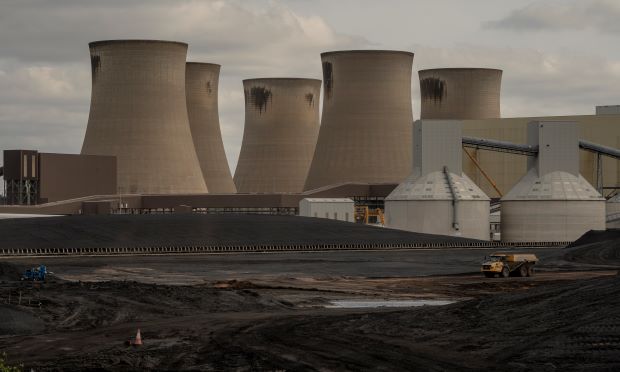Once a leading polluter, the UK is now trying to lead on climate change
By Mark Landler
LONDON — As Britain begins hosting a landmark climate summit in Glasgow, Scotland, the milestones of its own evolution to a more climate-friendly economy are on vivid display along the railroad line from London to Scotland.
Near Gainsborough, a river town 150 miles north of the capital, one of Britain’s last coal-fired power plants still spews carbon dioxide and other gases into the air. Another 150 miles north, off the coast of the seaside port of Blyth, the slender blades of five turbines in an offshore wind farm turn lazily in the breeze.
The two plants, both owned by French utility giant EDF, illustrate how far Britain has come. The coal station, restarted recently to cover a shortfall in electricity, is scheduled to be taken out of operation next year, while the company plans to install experimental floating turbines in the waters off Blyth.
“We’re talking about a huge transition,” said Paul Spence, director of strategy and corporate affairs at EDF, referring to Britain’s goal of being a carbon-neutral economy by 2050. “A lot of things need to happen to keep the lights on.”
Britain is not just the host of the climate meeting, known as COP26; it has a credible claim to being a global leader in climate policy. The birthplace of the Industrial Revolution, Britain became the first country to legally mandate reductions in greenhouse gas emissions through the Climate Change Act in 2008. Its high-tech windmills and superannuated smokestacks are only the most visible evidence of a three-decade campaign.
Having built the world’s largest offshore wind industry, Britain has reduced emissions by 44% from 1990 levels. Its target to cut them by at least 68% by 2030 is one of the most ambitious of any major economy, according to the Climate Action Tracker, a scientific analysis of the policies of countries.
If Britain achieves that target, which is far from clear, it would be one of a handful of countries doing enough to fulfil the key goal of the Paris Agreement: limiting the long-term rise in the planet’s temperatures to 1.5 degrees Celsius.
To hit its headline number, Prime Minister Boris Johnson’s government has set out a series of attention-grabbing goals: End the sale of all gasoline- and diesel-fuelled cars by 2030; end the use of all coal and gas-fired power plants by 2035; and end the sale of all fossil-fuelled home heating systems by 2035.
“The UK was first out of the blocks with the climate act, and it inspired Sweden and then Germany,” said Johan Rockström, director of the Potsdam Institute for Climate Impact Research in Germany. “The UK has successfully been able to phase out coal, which is very symbolic because it first started in England.”
The temporary restart of the coal plant near Gainsborough — made necessary by low winds on the North Sea that slowed the turbines — shows that this transition is not without hiccups. A lack of wind or sun can stymie renewable energy sources.
Local resistance has constricted the development of the onshore wind industry. Fears about energy reserves have led Britain to consider allowing drilling in a vast new oil field off the Shetland Islands. There is even a proposal for a new coal field in Cumbria, in northwest England.
Climate experts also fault Johnson for not laying out a realistic road map to achieve his ambitious emissions goals. Britain has failed to raise adequate funds to finance clean-energy projects. It has not shown farmers, key drivers in reducing emissions, how they can contribute by cultivating peat lands and other conservation techniques.
Nor is Britain the diplomatic dynamo it once was. When Johnson convenes more than 100 countries in Glasgow, he will push some vaulting goals, including a global end to the use of coal. But he will do so as the leader of a country that divorced itself from the European Union and has so far been unable to galvanize the world’s biggest emitters: China, the United States and India.
Still, for all the fears of backsliding, Britons evince genuine pride about being pioneers in the transition to a carbon-neutral future. After all, said Alice Bell, a London-based climate change campaigner, “We led the world into this problem.”
To some extent, Britain’s leadership is an accident of history, rooted in Prime Minister Margaret Thatcher’s bitter showdown with striking coal miners in 1984. By crushing the union and slashing subsidies for the coal industry, Thatcher accelerated Britain’s search for alternative energy sources, namely natural gas.
“She got rid of the coal miners for a combination of political and economic reasons,” said Tom Burke, chair of E3G, an environmental think tank, and a former government adviser. “But it gave the UK a degree of freedom of action that wasn’t available to other countries.”
Though Thatcher later came to view climate activism as a left-wing preoccupation, she gave two speeches in 1989 that historians say were the first significant statements on climate change by a world leader.
“What we are now doing to the world — by degrading the land surfaces, by polluting the waters and by adding greenhouse gases to the air at an unprecedented rate — all this is new in the experience of the Earth,” she said to the United Nations.
Thatcher planted the seed for a bipartisan cause, as Conservative and Labour governments sought to burnish their green credentials. British diplomats played key roles in brokering climate deals in Rio de Janeiro and Kyoto, Japan. Britain installed climate attachés in its embassies around the world.
Johnson, who once scoffed that wind farms would “barely pull the skin off a rice pudding,” now speaks about climate change with the zeal of the converted. They say he has been convinced of the need for action by his third wife, Carrie Johnson, who campaigns against plastic pollution.
-New York Times


